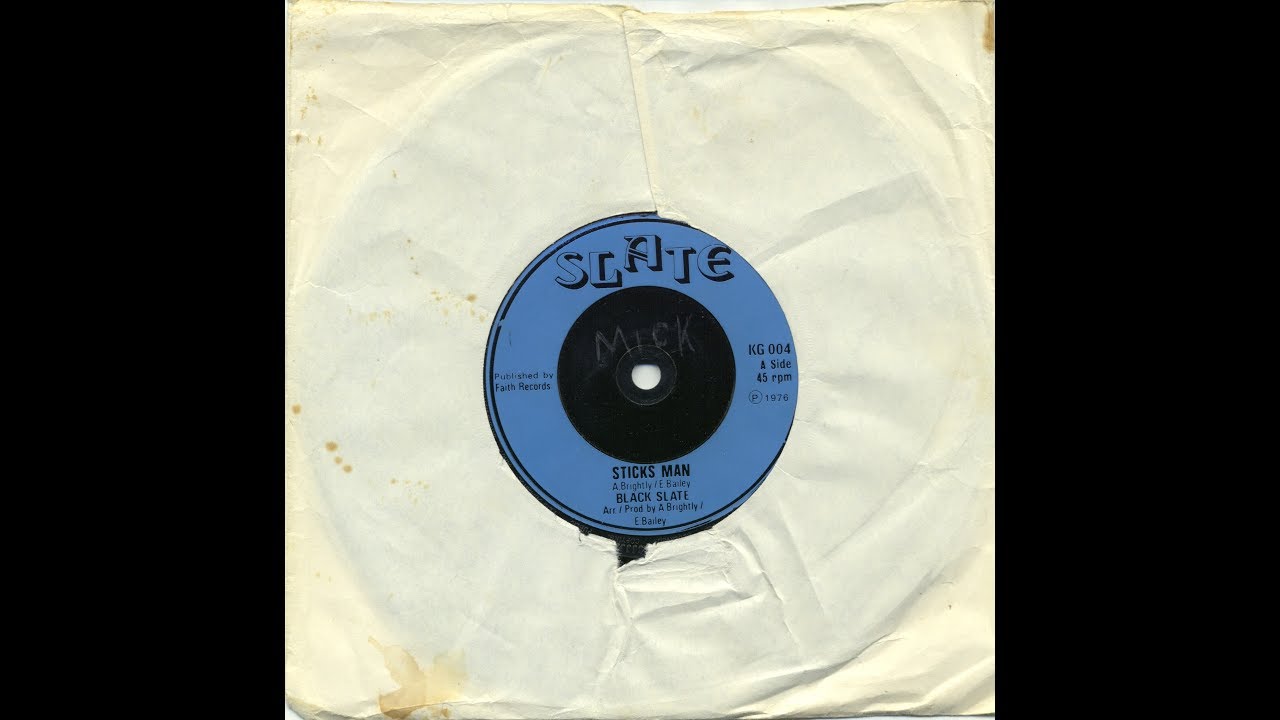Black Slate – Slate Records – 1976
Up there with the very best in Black British reggae, “Sticksman” by Black Slate. An exceptional record. Play loud enough to shatter windows. Great stuff.
Black Slate were formed in 1974 in London and began to gig on the London reggae scene, working as a backing band for visiting Jamaican artists such as Dennis Brown or Delroy Wilson.
Black Slate gradually acquired a reputation as a skilful reggae band and recorded their first singles, “Piano Twist” and “Sticks Man” on Slate Records in 1976.
In 1978, Black Slate released the 12” single “Live Up To Love”, again on Slate Records, the last release on that record label.
In 1979, “Mind Your Motion” was released on TCD Records, a new record label that would look after Black Slate’s recorded output for the next couple of years.
The following year in 1980, Black Slate’s new single “Amigo” was a surprise chart hit in the U.K, going up the singles chart to end up in the top 10. Following on from that spate of success, an album of the same name was released to critical appraise.
1981 saw the release of “Sirens In The City” and of the single “Boom Boom” which was, again, very successful.
The text below was ripped from the furious.com site. Thank you to that site in advance.
The members of Black Slate grew up in England and were united by their Black British background. Most of them had spent at least half their lives in England and, therefore, their songs reflected the Black British community’s concerns. A case in point is their single, “Sticks Man”.
Sticks man, why you do that?
Robber man, why you do that?
Say it was your mother,
Say it was your father.
Would you like that?
You go to work every day,
At the end of the week, you get your pay.
Sticks man, why you do that?
Robber man, why you do that?
You no rob the bank,
You no rob the rich.
You know black and white is the same,
No bother tell I-man that.
You say that you take away the tax
That they took from us.
You also take it from the Blacks.
If you tief a white, you will tief a black.
Hustle, hustle inna right way, my brethren! I beg you!
It’s the truth.
You have to bow to truth and rights!
Bow!
With its scat intro, grumbling bass line, eerie keyboard sound and sombre lyrics, “Sticks Man” signalled that Black British reggae had come of age and was at least the equal of its Jamaican counterpart.
That song was released in 1976, at a time when tensions between West Indian and African immigrants, Black British and the police forces in England were rising.
The 1976 Notting Hill Carnival held that year had ended in violence when the presence of the police had angered the local community.
In the 1970’s, a major social issue in England was the SUS laws, Section 4 of the Vagrancy Act 1824, which allowed the police to stop and search any person they thought might have the intention of committing a crime. The police could arrest any person they thought was “loitering with intent.”
The early 1970’s were also marked by a worldwide oil crisis which led to a rise in the unemployment rate in England for the whole population, but the unemployment rate for the black population rose twice as much as the rate for the native English population.
Partially because of the crisis, immigrants were blamed and scapegoated for the lack of jobs and stereotyped as violent “muggers.” Between 1971 and 1973, some British newspapers began to use the word “mugging” in relation with crime and the issue of violence in some black neighborhoods across the cities and towns of the UK which would give the impression that mugging was a specifically “black” problem. In such a context, the black community became unfairly associated with crime and violence.
But in “Sticks Man”, Black Slate dared speak the unspeakable and they addressed the issue of black crime. “Sticks man” at the time was the latest Jamaican slang for “thief” or “mugger.” Instead of writing an anti-police song, the group focused on the problem of juvenile delinquency within the black community – black on black crime.
The message seems to be that these young muggers provided bogus excuses to rob other people and did not “hustle inna the right way.” Instead of crime, they are encouraged to turn to “truth and rights,” that is, the more positive force of Rastafarianism.
Like Aswad, Misty In Roots, and Steel Pulse, Black Slate showed that British reggae was a force to be reckoned with in worldwide reggae circles, owning its own sound and its own thematic concerns.





